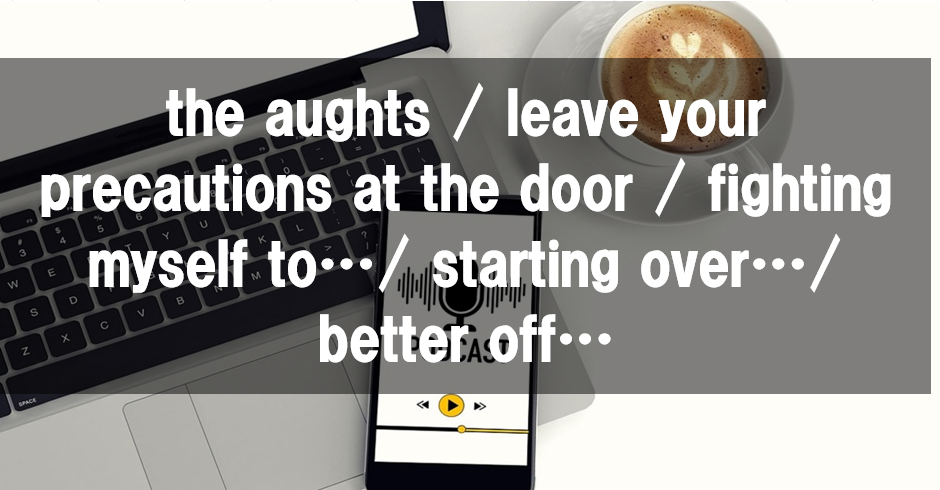ALL EARS ENGLISH エピソード378の内容から確認したフレーズ
- the aughts
- Leave your preconceptions at the door
- Ignore your inclination to ….
- Fighting myself to…
- Starting over…
- better off…
the aught
“Aught” は、文脈によって意味が変わる単語ですが、現代では「ゼロ(0)」の意味でよく使われます。
特に “the aughts” という表現では、「2000年代(2000年~2009年)」を指します。
- 例: The music of the aughts was heavily influenced by hip-hop.
(2000年代の音楽はヒップホップの影響を強く受けていた。)
会話の中では、“Time in the aughts probably switched over to electric records from the physical records.”と言っていて、「2000年代には、おそらく物理的なレコードから電気的なレコードに移行した。」となります。
Leave your preconceptions at the door
“Leave your preconceptions at the door” は、直訳すると「先入観をドアのところに置いていけ」という意味ですが、実際には 「先入観を捨ててください」「固定観念を持たずに臨んでください」 というニュアンスで使われます。
- 新しい考えを受け入れるよう促すとき
- When you start learning a new language, leave your preconceptions at the door.
(新しい言語を学ぶときは、先入観を捨てて取り組んでください。)
- When you start learning a new language, leave your preconceptions at the door.
- 偏見を持たずに物事を見るように言うとき
- If you want to enjoy modern art, leave your preconceptions at the door.
(現代アートを楽しみたいなら、固定観念を捨ててください。)
- If you want to enjoy modern art, leave your preconceptions at the door.
つまり、このフレーズは「オープンな心で物事に向き合うこと」を求めるときに使われる表現です。
別の表現を使いたいなら、
- Please set aside any preconceptions before we begin.
- I encourage you to approach this with an open mind.
などが類似表現になります。
Ignore your inclination to …
“Ignore your inclination to …” は、直訳すると「…したいという傾向を無視しなさい」という意味ですが、実際には 「ついやってしまいがちなことをやらないようにしなさい」 というニュアンスになります。
- ある行動を控えるように促すとき
- Ignore your inclination to interrupt and listen carefully.
(口を挟みたくなる気持ちを抑えて、じっくり聞いてください。)
- Ignore your inclination to interrupt and listen carefully.
- 衝動的な行動をやめるようにアドバイスするとき
- Ignore your inclination to check your phone every five minutes.
(5分ごとにスマホをチェックしたくなる気持ちを抑えてください。)
- Ignore your inclination to check your phone every five minutes.
つまり、「普段無意識にやってしまうことを意識的にやめるように」と促す表現です!
fighting myself to…
“Fighting myself to…” は、直訳すると「自分自身と戦いながら~する」となりますが、実際には 「~しないように自分を抑えている」「~するのを我慢している」 という意味になります。
- 衝動を抑えようとするとき
- I’m fighting myself to not eat this whole cake.
(ケーキを全部食べないように必死に我慢している。)
- I’m fighting myself to not eat this whole cake.
- やりたくないことを無理にやろうとしているとき
- I’m fighting myself to get out of bed this morning.
(今朝はベッドから出ようと自分を奮い立たせている。)
- I’m fighting myself to get out of bed this morning.
つまり、この表現は 「何かをしたい(またはしたくない)気持ちと葛藤している」 というときに使われます!
starting over…
“Starting over…” は 「最初からやり直す」 という意味です。
- 仕事やプロジェクトを最初からやり直すとき
- I made too many mistakes, so I’m starting over.
(ミスが多すぎたので、最初からやり直している。)
- I made too many mistakes, so I’m starting over.
- 人生のリスタートを意味するとき
- After the divorce, she decided to move to a new city and start over.
(離婚後、彼女は新しい街に引っ越して人生をやり直すことにした。)
- After the divorce, she decided to move to a new city and start over.
- 会話や説明をやり直すとき
- Sorry, I lost my train of thought. Let me start over.
(ごめん、話がまとまらなくなった。最初から言い直すね。)
- Sorry, I lost my train of thought. Let me start over.
ということで、この表現は 物事をゼロからやり直すとき に使われます。
better off…
“Better off” は 「より良い状態になる」「得をする」「状況が良くなる」 という意味の表現です。
番組中の会話では、“We will be much better off for it in the long run.”と使われています。→ 「長い目で見れば、そのおかげで私たちはもっと良い状態になるだろう。」
この場合、「将来的にメリットがある」「結果的に良くなる」というニュアンスを持っています。
“Better off” の使い方の例
- 経済的・物質的に良い状態になるとき
- If you save money now, you’ll be better off in the future.
(今お金を貯めれば、将来もっと楽になるよ。)
- If you save money now, you’ll be better off in the future.
- 状況が改善されるとき
- You’re better off leaving that toxic relationship.
(そんな有害な関係は断ち切ったほうがいいよ。)
- You’re better off leaving that toxic relationship.
- 「~した方がいい」というアドバイス的な使い方
- You’d be better off studying more before the exam.
(試験前にもっと勉強したほうがいいよ。)
- You’d be better off studying more before the exam.
better offのフレーズは、offがなくても良いような気がしますが、やはりoffがあるほうが自然で、意味が明確になります。
“Better” だけだと、単に「より良い」という意味になりますが、“better off” で「現在の状態から改善される」「利益を得る」というニュアンスが加わり、単なる「better」よりも意味が具体的になります。
- “We will be better off for it in the long run.”
→ この文では、「最終的に状況が改善される」という意味がしっかり伝わります。 - “We will be better in the long run.”
→ こちらは「良くなる」という意味になりますが、「得をする」「改善される」というニュアンスは薄くなります。


